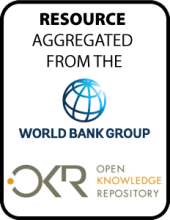Land Library
Bienvenido a la biblioteca de Land Portal. Explora nuestra amplia colección de recursos de acceso abierto (más de 74.000), que incluye informes, artículos de revistas científicas, trabajos de investigación, publicaciones revisadas por pares, documentos jurídicos, vídeos y mucho más.
/ library resources
Showing items 109 through 117 of 4461.Dryland regions in Sub-Saharan Africa are home to one-half of the region’s population and three-quarters of its poor. Poor both in natural resources and in assets and income, the inhabitants of drylands are highly vulnerable to droughts and other shocks.
More than 200 million people living in dryland regions of Sub-Saharan Africa make their living from agriculture.
In rural societies of low- and middle-income countries, land is a major measure of wealth, a critical input in agricultural production, and a key variable for assessing agricultural performance and productivity.
This study combines high-resolution, geo-spatial data and household data from the Vietnam Living Standard Measurement Surveys in 2010, 2012, and 2014 to investigate the relationship between environmental risks and poverty.
Agriculture, and the patterns of land-use change that are associated with it, have a significant ecological footprint, including the effects it has on climate change, accounting for about one-quarter of anthropogenic greenhouse gas (GHG) emissions globally.
In many countries, hydropower development is rapidly becoming a focus of green growth policies. This represents a significant opportunity for ecosystem services-based land management that integrates environmental and development goals to benefit the hydropower sector and support economic growth.
The primary focus of this book is on a specific outcome of the rule of law: the practical enforcement of laws and policies, and the determinants of this enforcement, or lack thereof. Are there significant and persistent differences in implementation across countries?
This is volume 2 of a three-volume publication on Bangladesh’s trade prospects. Bangladesh’s ambition is to build on its very solid growth and poverty reduction achievements, and accelerate growth to become a middle income country by 2021, and share prosperity more widely amongst its citizens.
This report was prepared as part of the
World Bank engagement in the Philippines to support Islamic
Finance and Financial Inclusion. It provides an overview on
the context for the development of Islamic finance in the









